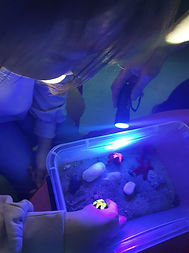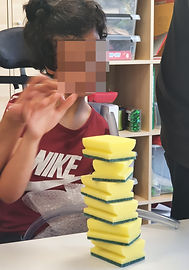
Basaler Erlebnis-Unterricht für das Fach Physik
Narrative perspective:
The protagonist of the stories is a puppet named Louis. He serves as a recognizable symbol for basic physics instruction. He guides the students through the individual stories.
As described in the introduction, the individual stories consist of building blocks or serve as a resource for ideas. The individual blocks can be used flexibly, meaning they can be adapted depending on the time and student population. One story can be used to create multiple lessons.
Important! The stories are not read aloud, but told freely. The only important thing is that the story serves as a framework for the mood.
Structure of the stories:
The stories are structured so that they usually begin with a film, the weather described in the story, or the topic of the lesson. This is followed by experiments with the perceptual offerings, which are packaged within a historical context. At the end, the students bid farewell to their protagonist.
The current version of the Guidelines for Safety in Classrooms at General Education Schools in North Rhine-Westphalia (RISU-NRW) must be observed. See the description at the bottom of this page.
*1)Teaching guidelines for the goal-differentiated educational program Intellectual Development at all learning locations
in North Rhine-Westphalia
Field of activity: Science education (biology, chemistry, physics)
*2) Example of a school-internal curriculum for a special needs school with a focus on intellectual development, subject physics in the field of science teaching






Excerpts from the teaching guidelines for the goal-differentiated educational program Intellectual Development
The subject of physics in the field of science education
"Our reality in the natural and man-made environment unfolds along scientific rules and laws that have occupied people since recent times and will continue to do so. Thus, successive and increasingly differentiated scientific discoveries are inextricably linked to the cultural and social development of humanity. On the one hand, scientific discoveries and cognitive processes form the basis for our understanding of the world; on the other hand, developments and inventions in biology, chemistry, and physics shape our way of life and living environment. Against this background, it becomes clear that participation in our world shaped by the natural sciences must be made possible through scientific education." (Page 10, 1*)
"Content areas of physics offer opportunities for exploring related careers and fields of work. Especially with a view to the vocational practice level in the goal-differentiated intellectual development program, the opportunity for career and work exploration should be created in harmony with the thematic lesson planning as well as the individual interests and prerequisites of the learners." (Page 98, *1)
“The task area contributes to the development of elementary biological, chemical and physical education in the goal-differentiated educational program of intellectual development.
Through diverse insights into related career and work fields and through support in their personal development, they are prepared to make self-determined and responsible decisions regarding their own life planning. The lessons create opportunities for active engagement with their immediate environment. This also occurs through the use of digital tools and media. (Page 7, *2)
"In physics classes, natural and technical phenomena and their interrelationships are investigated. A phenomenological approach enables natural and technical phenomena close to everyday life to be individually perceived and described." The lessons support students in exploring questions and answering them both qualitatively and quantitatively with the help of simple experiments in the spirit of the scientific method of gaining knowledge (planning, conducting, observing, interpreting).
"The subject content will be assessed for its relevance to the individual student's everyday life. With the goal of maximizing active participation, the use of assistive technologies (Glossary) to compensate for disability-related limitations should be individually assessed." (Page 13, *1)
Dealing with basic mechanical laws enables students to use tools appropriately, economically and in a goal-oriented manner.
A hands-on exploration of permanent magnets enables students to take a hands-on and exploratory approach to gaining scientific knowledge. (*1, page 99)
Referring to the section of the NRW teaching guidelines for the subject area “Science Education”, physics, it is important that the pupils experience the teaching content at the basic level.






